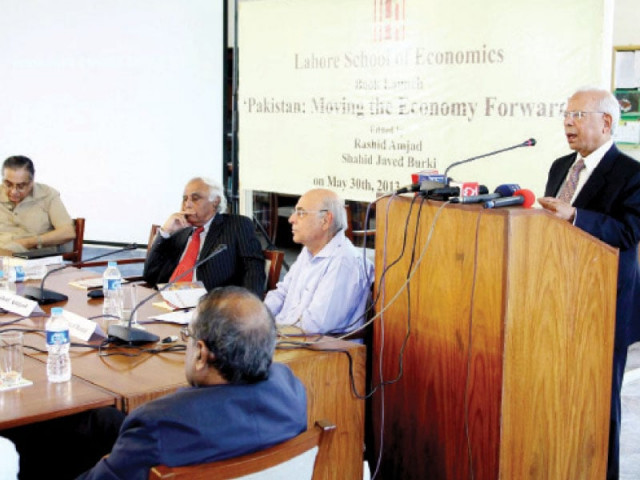Book launch: ‘India should be granted conditional MFN status’
Speakers suggest ways to fix the economy.

Hussain said regulatory bodies should be separated from policy-making with minimum intervention from the federal government.
The crux of the country’s economic problem is implementation and delivery of services not a lack of ‘good’ policies, Dr Ishrat Hussain, the former State Bank of Pakistan governor, said on Thursday. He was speaking at the launch of a book, Pakistan: Moving the Economy Forward, here at the Lahore School of Economics’ main campus.
Hussain, who is the Director of the Institute of Business Administration, Karachi, said there was a dire need to bridge the gap between policy-making and research. He called for a balance between civil servants who could look at the technical aspects of feasibilities, and politicians who could assess them.
Hussain said regulatory bodies should be separated from policy-making with minimum intervention from the federal government.
Dr Amjad, the LSE Graduate Institute of Development Studies director, said the book [edited by Dr Rashid Amjad and Shahid Javed Burki] addressed the central question: how to reverse the current prolonged period of low growth and high inflation in the country. He said overcoming growth constraints, improving economic management and reducing corruption were necessary to revive investment in Pakistan.

Amjad said that increasing investment from the current 12.5 per cent of GDP to 30 per cent of GDP would generate enough productive employment in Pakistan for it to compete internationally.
Dr Hafiz Pasha, the former finance minister and the Beaconhouse National University’s School of Social Sciences dean, praised the book and urged the editors to present it to national economic managers. He said the book should also be prescribed for postgraduate courses on the country’s economy.
Speaking about a chapter in the book about Pak-India trade, Pasha said a policy of ‘careful gradualism’ with India was required, especially in the import of medicines. He said he supported granting a conditional most favoured nations (MFN) status to India.
Dr Pervez Tahir, the former Planning Commission of Pakistan chief economist, said the most important message of the book was the rehabilitation of investment as a key driver of growth. Amjad said the book was well-researched and contributed important insights into how black money was being whitened in the country.
Dr Aisha Ghaus Pasha compared the low tax to GDP ratio in Pakistan with 13 other economies. She said direct taxes, tax exemptions, tax evasion and the culture of giving concessions needed to be addressed urgently.
Dr Naved Hamid discussed the opportunities and pitfalls for Pakistan’s trade with China, United Arab Emirates, India and Afghanistan.
Dr Teresa Thompson Chaudhry said the number of non-poor has increased in Pakistan from 2004-2010.
She said the Punjab was the only province which had seen major improvement in poverty reduction.
Published in The Express Tribune, May 31st, 2013.



















COMMENTS
Comments are moderated and generally will be posted if they are on-topic and not abusive.
For more information, please see our Comments FAQ